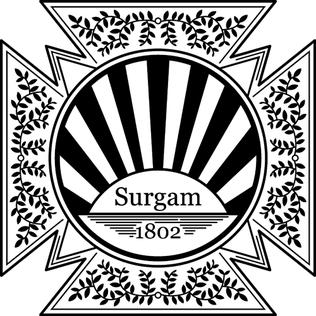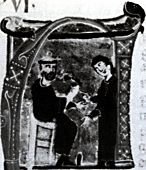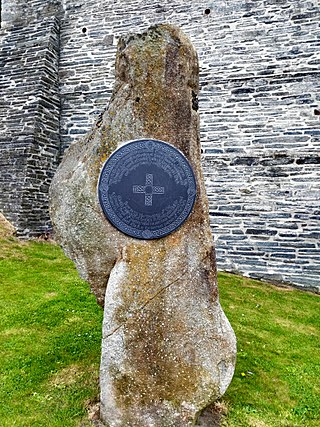
In Celtic cultures, a bard is a professional story teller, verse-maker, music composer, oral historian and genealogist, employed by a patron to commemorate one or more of the patron's ancestors and to praise the patron's own activities.
A bardic name is a pseudonym used in Wales, Cornwall, or Brittany by poets and other artists, especially those involved in the eisteddfod movement.

In Welsh culture, an eisteddfod is an institution and festival with several ranked competitions, including in poetry and music. The term eisteddfod, which is formed from the Welsh morphemes: eistedd, meaning 'sit', and fod, meaning 'be', means, according to Hywel Teifi Edwards, "sitting-together." Edwards further defines the earliest form of the eisteddfod as a competitive meeting between bards and minstrels, in which the winner was chosen by a noble or royal patron.

Edward Williams, better known by his bardic name Iolo Morganwg, was a Welsh antiquarian, poet and collector. He was seen as an expert collector of Medieval Welsh literature, but it emerged after his death that he had forged several manuscripts, notably some of the Third Series of Welsh Triads. Even so, he had a lasting impact on Welsh culture, notably in founding the secret society known as the Gorsedd, through which Iolo Morganwg successfully co-opted the 18th-century Eisteddfod revival. The philosophy he spread in his forgeries has had an enormous impact upon neo-Druidism. His bardic name is Welsh for "Iolo of Glamorgan".
Welsh poetry refers to poetry of the Welsh people or nation. This includes poetry written in Welsh, poetry written in English by Welsh or Wales-based poets, poetry written in Wales in other languages or poetry by Welsh poets around the world.

The Philolexian Society of Columbia University is one of the oldest college literary and debate societies in the United States, and the oldest student group at Columbia. Founded in 1802, the society aims to "improve its members in Oratory, Composition and Forensic Discussion." The society traces its roots to a collegiate literary society founded in the 1770s by Alexander Hamilton, then a student at Columbia College, and was officially established by Hamilton's son, James Alexander Hamilton.

Breton literature may refer to literature in the Breton language (Brezhoneg) or the broader literary tradition of Brittany in the three other main languages of the area, namely, Latin, Gallo and French – all of which have had strong mutual linguistic and cultural influences.

The Honourable Society of Cymmrodorion, often called simply the Cymmrodorion, is a London-based Welsh learned society, with membership open to all. It was first established in 1751 as a social, cultural, literary and philanthropic institution. It fell into abeyance between 1787 and 1820, and again between 1843 and 1873. In its second and third incarnations its interests have been predominantly cultural and antiquarian. The present society claims continuity from that founded in 1751, although the three successive societies have in fact been slightly different in character and aims.

Welsh Americans are an American ethnic group whose ancestry originates wholly or partly in Wales, United Kingdom. In the 2008 U.S. Census community survey, an estimated 1.98 million Americans had Welsh ancestry, 0.6% of the total U.S. population. This compares with a population of 3 million in Wales. However, 3.8% of Americans appear to bear a Welsh surname.
The culture of Minnesota is a subculture of the United States with influences from Scandinavian Americans, Finnish Americans, Irish Americans, German Americans, Native Americans, Czechoslovak Americans, among numerous other immigrant groups. They work in the context of the cold agricultural and mining state.

Professor Thomas Gwynn Jones C.B.E., more widely known as T. Gwynn Jones, was a leading Welsh poet, scholar, literary critic, novelist, translator, and journalist who did important work in Welsh literature, Welsh education, and the study of Welsh folk tales in the first half of the twentieth century. He was also an accomplished translator into Welsh of works from English, German, Greek, and Irish.

The Bards of Wales is a ballad by the Hungarian poet János Arany, written in 1857. Alongside the Toldi trilogy, it is one of his best known works.
Goronwy Owen was one of the 18th century's most notable Welsh poets. He mastered the 24 traditional bardic metres and, although forced by circumstances into exile, played an important role in the literary and antiquarian movement in Wales often described as the Welsh 18th-century Renaissance.

A puy or pui was a society, often organised as a guild or confraternity, sometimes along religious (Catholic) lines, for the patronisation of music and poetry, typically through the holding of competitions. The term puy derives from the Latin podium, meaning "a place to stand", referring probably to a raised platform from which either the contests delivered their works or the judges listened to them. Puys were established in many cities in northern and central France, the Low Countries, and even England during the High Middle Ages and the Renaissance, usually encouraging composition in the Old French language, but also in Latin and Occitan.

Welsh-language literature has been produced continuously since the emergence of Welsh from Brythonic as a distinct language in around the 5th century AD. The earliest Welsh literature was poetry, which was extremely intricate in form from its earliest known examples, a tradition sustained today. Poetry was followed by the first British prose literature in the 11th century. Welsh-language literature has repeatedly played a major part in the self-assertion of Wales and its people. It continues to be held in the highest regard, as evidenced by the size and enthusiasm of the audiences attending the annual National Eisteddfod of Wales, probably the largest amateur arts festival in Europe, which crowns the literary prize winners in a dignified ceremony.

The Loft Literary Center is a non-profit literary organization located in Minneapolis, Minnesota incorporated in 1975. The Loft is a large and comprehensive independent literary center and offers a variety of writing classes, conferences, grants, readings, writers' studios and other services to both established and emerging writers.

The 1176 Cardigan eisteddfod, as it is commonly described, was a cultural tournament involving bards and musicians, held in the grounds of Cardigan Castle, Cardigan, West Wales, by the Lord Rhys ap Gruffydd. Though the term eisteddfod was not commonly used until several centuries later, the 1176 gathering is commonly claimed to be the earliest recorded forerunner of the modern national eisteddfod event.
The National Federation of State Poetry Societies, Inc. (NFSPS) is a national organization of state poetry societies in the United States. It was established in 1959 and now includes affiliates in 32 U.S. states. The federation hosts conferences and maintains awards and educational programs related to poetry.
The Poetry Society of Oklahoma (PSO) is a non-profit state-level poetry association in the U.S. state of Oklahoma. The organization is affiliated with the National Federation of State Poetry Societies (NFSPS), and promotes poetry, conducts monthly and annual contests, publishes poetry books and organizes periodic meetings, workshops and festivals.
The Poetry Society of Michigan (PSM) is a non-profit state-level poetry association in the U.S. state of Michigan, which is affiliated with the National Federation of State Poetry Societies (NFSPS). The organization promotes poetry, conducts monthly and annual contests, publishes poetry books and organizes periodic meetings, workshops and festivals.












